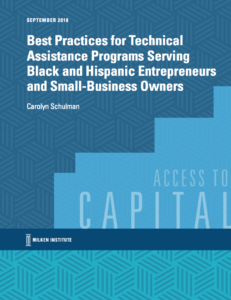 Best Practices for Technical Assistance Programs Serving Black and Hispanic Entrepreneurs and Small-Business Owners
Best Practices for Technical Assistance Programs Serving Black and Hispanic Entrepreneurs and Small-Business Owners
Carolyn Schulman, The Milken Institute
First published September 2018
In conjunction with the Partnership for Lending in Underserved Markets (PLUM), a Milken Institute and U.S. Small Business Administration initiative to develop actionable solutions to long-standing barriers that constrain minority entrepreneurs from accessing capital, the PLUM Los Angeles Technical Assistance Working Group spent considerable time exploring what culturally competent technical assistance looks like and identifying best practices around program design, service delivery, curriculum, and marketing and outreach.
Technical assistance is the education and guidance provided to entrepreneurs and small business owners to help them start and grow businesses. As it builds the capacity of organizations to operate effectively, technical assistance positions entrepreneurs and small businesses to access capital. To effectively reach and support Black and Hispanic small business owners, technical assistance needs to be culturally competent.
Developing cultural competence is a dynamic and complex process requiring ongoing assessment and feedback, but it is necessary for building trust between technical assistance providers and Black and Hispanic entrepreneurs and small business owners. By implementing culturally competent best practices around program design, service delivery, curriculum, and marketing and outreach, TA providers can more effectively reach and support these populations.
Download Resource